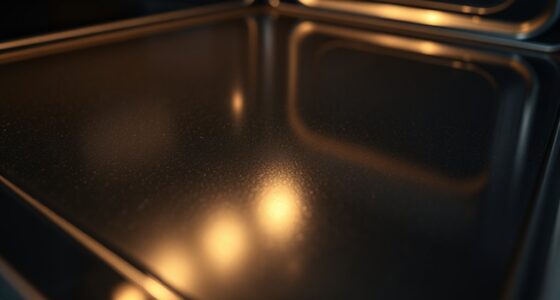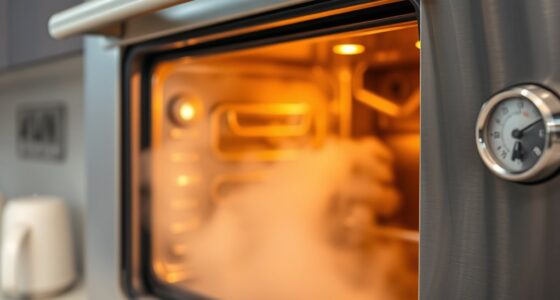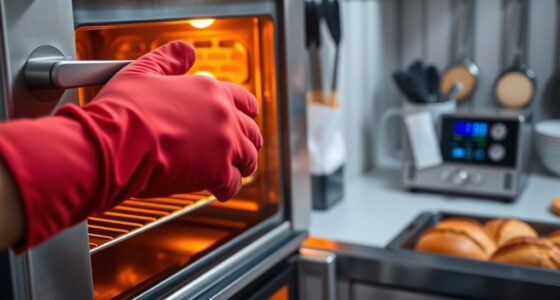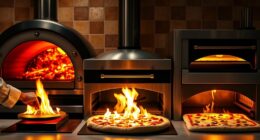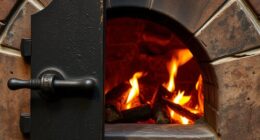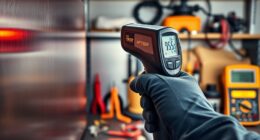When cooking outdoors in wind or rain, focus on safety by using rain-resistant cookware and seeking shelter like pavilions or covered patios. Secure your cookware firmly to prevent tipping, and keep a fire extinguisher nearby for emergencies. Avoid outdoor cooking during severe weather, and monitor weather updates regularly. Proper equipment and awareness can make stormy conditions safer. Stay prepared and cautious, and you’ll find more tips to cook confidently even in unpredictable weather.
Key Takeaways
- Use rain-resistant cookware and secure it firmly to prevent spills or tipping during windy or rainy conditions.
- Seek shelter under covered areas like pavilions or patios to protect cooking setups from weather elements.
- Always have a fire extinguisher nearby and avoid outdoor fires if weather becomes severe or uncontrollable.
- Postpone outdoor cooking until weather conditions improve to ensure safety and prevent accidents.
- Regularly monitor weather forecasts and recognize signs of severe weather to proactively adjust or cancel outdoor activities.
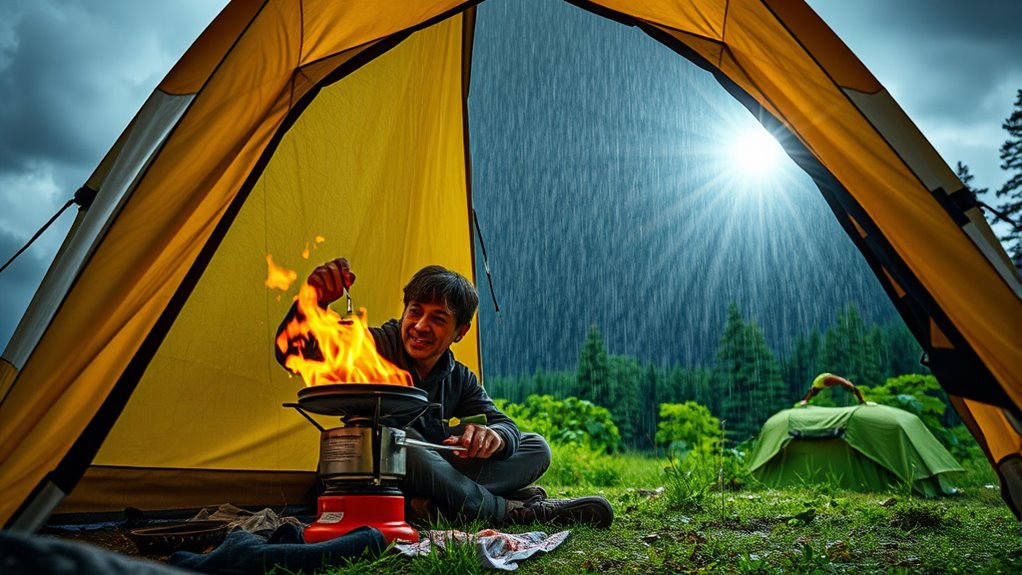
Weather Safety
Have you ever wondered how to stay safe during severe weather? When storms roll in, especially with heavy rain or gusty winds, it’s essential to prioritize your safety while still managing to cook or prepare food. Storm preparedness isn’t just about securing your home; it also involves knowing how to cook safely outside or in less-than-ideal weather conditions. One key element is having the right equipment—specifically, rain resistant cookware. This type of cookware can make a significant difference, allowing you to continue cooking without exposing yourself to the elements or risking accidents.
During stormy weather, wind and rain can turn outdoor cooking into a dangerous challenge. Wind can blow out flames or cause unstable fires, while rain can flood cooking surfaces or make traditional cookware unsafe to use. That’s where rain resistant cookware comes into play. These specialized pots and pans are designed to withstand moisture and prevent leaks, so you don’t have to worry about water seeping in or ruining your meal. They’re particularly useful if you’re caught outside unexpectedly or if you’re trying to cook during a weather alert. With rain resistant cookware, you can set up a safe cooking station, shielded from the rain, and focus on preparing your food without risking burns, spills, or further weather damage.
To ensure your safety, always check weather forecasts and have a storm preparedness plan in place. If you know a storm is approaching, it’s best to avoid outdoor cooking altogether unless you have a sturdy shelter and rain resistant equipment. When cooking outdoors in stormy weather, seek out natural or man-made shelters such as pavilions, garages, or covered patios. These provide protection from wind and rain, reducing the risk of accidents. If you must cook in the open, secure your cookware firmly to prevent tipping and keep a fire extinguisher handy. Using rain resistant cookware allows you to continue your cooking activities with confidence, knowing that your gear is built for the conditions. Additionally, choosing appropriate equipment can help you better handle weather challenges safely.
Ultimately, staying safe during severe weather involves preparation and the right gear. Rain resistant cookware isn’t just a convenience; it’s a safety tool that can help you avoid exposure to the elements while still getting your meals prepared. Remember, your safety always comes first—so if the weather becomes too severe, it’s best to postpone outdoor cooking and wait until conditions improve. Proper storm preparedness, combined with the right equipment, ensures you can handle weather challenges confidently and keep yourself safe during any storm.
Frequently Asked Questions
Can I Use a Portable Stove During Heavy Rain?
Using a portable stove during heavy rain isn’t safe, especially if it’s gas-powered. You should avoid outdoor cooking in such conditions. Instead, opt for indoor grilling or electric appliances that are protected from the elements. These options let you cook safely without risking fire or electrical hazards. Remember, safety comes first—wait for better weather or move your cooking indoors to stay protected and avoid accidents.
How Can I Prevent Wind From Knocking Over My Grill?
To prevent wind from knocking over your grill, you should set up wind protection like windbreaks or barriers around it. make sure your grill has stable, level footing, and consider anchoring it with weights or stakes if possible. Keep the grill away from loose objects that could be blown into it. By focusing on grill stability and creating effective wind protection, you keep your cooking safe and steady in windy conditions.
Is It Safe to Cook Outdoors During a Thunderstorm?
You shouldn’t cook outdoors during a thunderstorm, as lightning safety is a top priority—storms are responsible for about 20% of lightning-related injuries. Storm preparedness means avoiding outdoor activities when lightning is detected nearby. The risk of a lightning strike is real, and being on a grill or open flame makes you more vulnerable. Instead, wait it out indoors to stay safe and avoid potential hazards.
What Clothing Should I Wear to Stay Dry and Safe?
To stay dry and safe, you should wear appropriate rain gear, such as a waterproof jacket and pants, along with a sturdy, wind-resistant outer layer. Choose clothing made of quick-drying materials to prevent discomfort. Don’t forget a hat with a brim to shield your face from rain, and waterproof footwear to keep your feet dry. Layer up to stay warm, especially if wind makes the weather colder.
Are There Alternative Cooking Methods for Bad Weather?
Think of your kitchen as a safe harbor during a storm. When weather’s rough, switch to indoor cooking methods like using a stove or microwave. These are essential for emergency preparedness, ensuring you can cook without risking wind or rain. You avoid hazards by staying inside, turning your home into a sturdy fortress. So, keep your emergency kit ready and utilize indoor appliances to stay safe and well-fed through any bad weather.
Conclusion
So, next time you’re caught in wind or rain, don’t let the weather spoil your cooking plans. Ironically, the very elements meant to challenge your outdoor meal can become part of the adventure if you stay safe. Just remember, a little rain or wind might add flavor to your story — not to your food or safety. Stay smart, stay dry, and enjoy those unpredictable weather moments without turning them into kitchen disasters.


